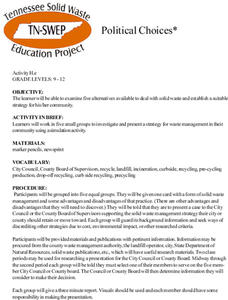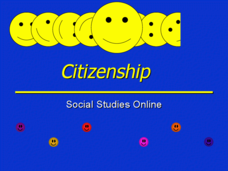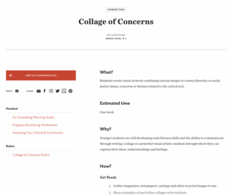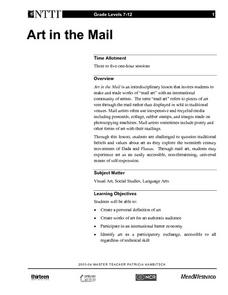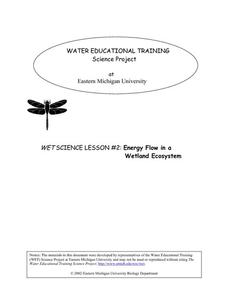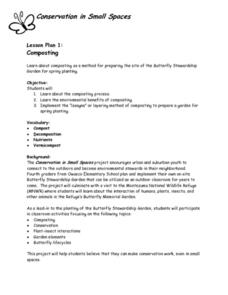Curated OER
Chapter 30: Government and Market Failure
Complete with a navigation tool and list of key terms, the slides in this presentation are bursting with pertinent information for your young economists. From studying public goods to graphs that detail the collective willingness to pay,...
Curated OER
Political Choices
Students, in small groups, investigate and present a strategy for waste management in their community using a simulation activity in which each group represents a sector of their community.
Curated OER
Add and Subtract Fractions with Like Denominators: 2 (Word Problems)
For this fraction worksheet, fourth and fifth graders solve six word problems, all having to do with adding or subtracting fractions with like denominators. This worksheet can be adapted to the Common Core standards in math.
Curated OER
Keep America Beautiful: Thinking Green in the Classroom
Stress the importance of community involvement to preserve the beauty of our Earth with these great ideas.
Curated OER
Plantable Pulp Cards
What a great way to give a gift that keeps on giving! These homemade plantable cards are not only beautiful, but can be planted into the ground to sprout in the right season. Incorporate this project in a science unit, or for a Mother's...
Curated OER
Bottled Water Ban
Convenience, taste, portability ... what's not to love about bottled water? Apparently, a lot. Scholars analyze the four main arguments supporting and opposing the sale of bottled water. They explore the health, environmental, and...
American Museum of Natural History
Be a Water Saver
Everyone must do their part to make a difference. The lesson link provides an 11-item questionnaire to reflect on conservation practices. Simple and straightforward, the lesson is perfect as a remote learning resource or as a tool for an...
Curated OER
The Environment
Students explore the issues that influence our environment and research ways to decrease the negative impact that humans have on the environment. Misconceptions about environmental issues are addressed in this lesson.
Curated OER
Pollution
Young ecologists investigate some of the many ways that human activities adversely affect the environment. After identifying the main types of pollution (air, water, soil), 3rd graders fill in a Venn Diagram by pasting cut-out pictures...
Curated OER
The Water We Drink
Third graders relate that the quality of their drinking water is subject to the condition of the environment and water found in streams and creeks in their community. They track the travel of a wad of paper from a student's desk to a...
Curated OER
Green Stuff: Designing an Earth-Friendly Room
In this activity students explore earth-friendly materials that can be used in home environments. They learn about the relationship between the environment and design, and use a variety of problem-solving strategies. They work in...
Curated OER
Quilt Block Collage
Learn the art of quilting with this lesson plan that can be connected to a history lesson on quilts in Ancient Egypt, China, and modern art. After studying a general history of quilts, its uses, and the history of different patterns,...
Curated OER
Citizenship
Young students view this presentation which goes over the concepts of being a good citizen, what volunteers do, what our basic rights are, and what types of organizations in our society are considered to be led by volunteers. The last...
K12 Reader
Excretory System
The subject of this life science reading comprehension instructional activity is the excretory system. After examining the provided article, readers respond to a series of questions using evidence found in the text.
Curated OER
How Does Water Cool?
How fast does water cool? First fifth graders will draw a line on a graph that predicts how fast they think water can cool from boiling. Then they plot the actual data on the same graph to see if their estimate was correct.
Wild BC
Carbon Sinks and Sources
Earth or environmental science pupils are assigned to be carbon sources or sinks. They ask yes-or-no questions to try to figure out which one they are. Then they discuss ways people can have positive effects on the changing climate by...
University of Southern California
Mastering Microbes
Small but mighty! Learners explore the role of microbes in a healthy ecosystem. An engaging lesson asks pupils to design an aquaponics system that demonstrates that healthy microbes are necessary to maintain the ecosystem.
Polar Trec
Where is the World's Water?
Scholars discover the amount of the Earth's water in various locations such as the ocean, ice, the atmosphere, etc. They then make a model of the how much water those percentages represent. Finally, analysis questions bring the concepts...
Teaching Tolerance
Collage of Concerns
A picture can speak louder than words. An interesting lesson introduces the themes of social justice and diversity to young learners by having them create artwork. Scholars create collages from a variety of sources to showcase what...
Curated OER
AZTEC TILES
Pupils observe the shapes and lines that make up Aztec sculpture, study Pre-Columbian art as they discover the Aztecs, Mayans and Incas. They create a small-scale Aztec tile using pasta. Creative, clever and engaging.
Curated OER
Art in the Mail
The "mail art" phenomena was started back in the 20's with the Dada and Fluxus art movements and revitalized in the 60's. The principle of mail art, is free exchange and artistic expression. Learners study these facts and then create...
Eastern Michigan University
Energy Flow in a Wetland Ecosystem
How is energy transferred within an ecosystem? What would happen to a food web if one of the organisms was removed? Elementary or middle school ecologists examine these questions and more in a comprehensive 5E learning cycle lesson....
Curated OER
Conservation in Small Places - Composting
A fabulous instructional activity introduces the art of composting to your gardeners. In it, youngsters learn about the composting process and how it actually works. They discuss the environmental benefits of composting, and use the...
Curated OER
Role of Masks in African Cultures
Students explore ancient tradition and craft of mask making, examine role or function of masks in African culture, create instruments, and participate in class projects.
Other popular searches
- America Recycles Day
- Reduce Reuse and Recycle
- Reduce Reuse Recycle
- Reduce Reuse Recycle Lesson
- Reduce Reuse Recycle Poems
- Reuse Recycle
- Reduce, Reuse, Recycle
- Recycle Paper
- Recycle, Reuse
- Reduce Recycle
- Recycle and Conserve
- Recycle Materials



